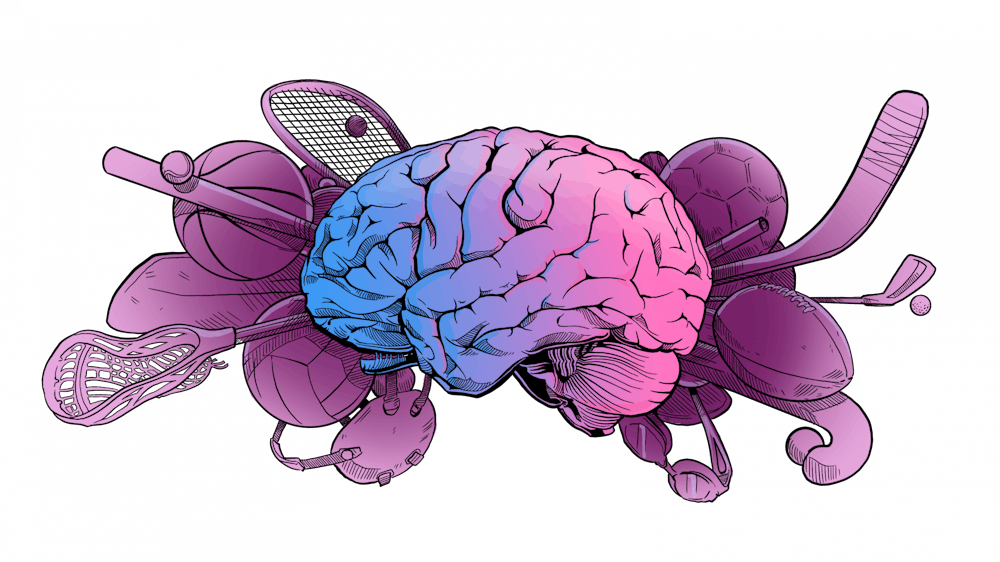Mental strength is just as important as physical strength, especially during a pandemic.
During a year when athletes have been forced to sit out of competition, many have taken the opportunity to focus on their mental performance. By focusing on mental performance during their time off, athletes are ensuring they are in the best position when competition returns.
Penn Athletics’ Sports Performance team supports Penn teams in their physical conditioning, nutrition, sports psychology, and mental health and performance. In her third year as Associate Athletic Director of Sports Performance, Dr. Andrea Wieland has been working on expanding the mental performance aspect. With her background and vast experience in mental conditioning, Wieland currently oversees the mental health and performance team.
“We’re really wanting to message that mental performance is really a mindset in how you approach and attack interviews and your career, and how you contribute to the larger picture,” Wieland said.
The primary goal of the Sports Performance team is to be the “team around the team” and be there to support all of Penn’s teams and individual athletes. The mental performance team meets with the coaching staff of each team at least twice a semester to assess the team’s needs and goals for the season. Coaches also have the opportunity to reach out to the Sports Performance team throughout the season for specific programming for the team.
The Sports Performance team then collaborates with the coaching staff to design and implement a plan that works best for their athletes. That involves incorporating mental training into their physical training by focusing on their breathing, self-talk, and goal setting. The mental performance gives athletes new guidance and ways in which they can approach their typical training.
“It’s really important to get in touch with that [mental] side of us as an athlete because there are so many untapped parts of us that have so much potential, on and off the field, that we don’t even know that we have,” senior field hockey midfielder and captain Erin Kelly said.
Athletes are typically accustomed to very structured and busy schedules, and the virtual nature of this semester has changed athletes’ day-to-day. The mental performance team has adjusted its programming and focus to emotional wellbeing and resilience.
RELATED:
Three takeaways from the DP's meeting with Associate AD for Sports Performance Andrea Wieland
“[It's about] how you get mental reps in, the imagery, studying film, or learning about your sport, so when we do come back there’s not a huge ramp up period,” Wieland said. “Training your brain is going to be beneficial when we do all get back together to train.”
Until the mental performance team is able to work with athletes in person again, it is doing its best to give athletes the best support possible in a virtual environment. Several teams have continued to take advantage of mental performance, despite its virtual nature.
Perhaps the most consistent team has been field hockey, meeting weekly for most of the fall semester. Penn field hockey’s journey with mental performance began in the spring of 2019. One of the main focuses for the team was improving its communication on the field.
“I think every athlete and team needs to be in touch with training our mental game as much as we train our physical side,” Kelly said.
Much like physical training, a large part of mental performance training is first learning what one needs to improve on. This fall, field hockey athletes utilized the Saboteur Assessment to learn about the biggest things about themselves that could potentially hinder their performance on the field. The assessment then allows them to recognize the different ways in which these saboteurs can present themselves and how to handle them. Some of the saboteurs included restlessness, hyper-achiever, controller, and hyper-vigilant.
“Especially restlessness and control have been a common theme for all of us because we’re so anxious to get back to playing,” Kelly said.
The regular mental training has allowed teams to have some type of routine during an irregular season. Not only has it been a welcome time to gather with teammates, it also gives them the space to gain useful mental skills that they can implement when they are able to return to competition. Even though they cannot practice together, athletes can take comfort in the fact that they are doing everything in their power to stay mentally sharp and ready to compete.









